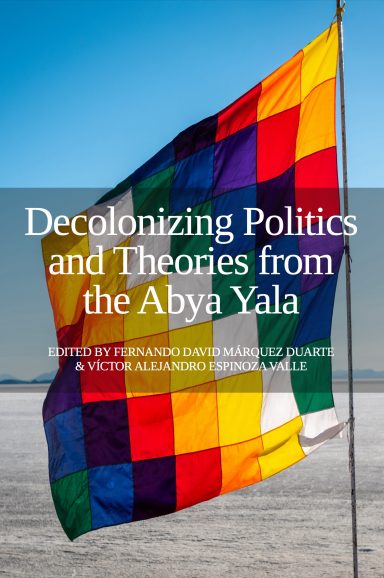This book addresses, from a decolonial approach, various aspects of the original history of Abya Yala. Together, the chapters provide a critical view of the colonization of Indigenous Peoples that not only explains social or economic subjugation of Latin American people, but also makes it clear that colonization is ontological and epistemological. It is a way of conceiving history and memory as subjugation imposed by those who set themselves up as lords and masters of the land and of the social and cultural heritage of Latin America. Thus, colonization must be conceived as a totality. Therefore, deconstructing the hegemonic vision of history is necessary in order to recognize the ancestral rights of Indigenous communities. The decolonial vision is radical in the sense that it goes beyond the European descendants or mestizo visions from which the explanation of Latin American development was constructed. This book aims to investigate the roots of hegemonic thought and provide theoretical and empirical tools to imagine other readings of Abya Yala.
Decolonizing Politics and Theories from the Abya Yala
Table of contents
Introduction – Aura Cumes
PART ONE: THEORETICAL DISCUSSIONS
Decoloniality And Contemporary Regionalism in Alianza Bolivariana Para Los Pueblos De Nuestra América (Alba) – Alina Ribeiro & Marina Scotelaro
Decolonizing South-South Cooperation: An Analytical Framework Founded on Post-Development and the Common – Marina Bolfarine Caixeta & Maria Do Carmo Reboucas Dos Santos
Armed Actors in the Colombian Conflict: State Vs Armed Groups – Deisy Milena Sorzano Rodriguez & Etienne Mulume Oderhwa
Decolonizing Environmental Politics: Sumak Kawsay as a Possible Moral Foundation for Green Policies – Valeria Victoria Rodríguez Morales
Latin American Critical Economic Thinking and the Labor Market – Rocio Arredondo & Javier Castellon
Latin American Antiphilosophies – Christina Soto Van Der Plas
PART TWO: PRAXIS ANALYSIS
The Crime of Defending a River: Domination, Racism, and Structural Violence in Guatemala – Miguel Alejandro Saquimux Contreras
Decolonising Social Movements in Latin America: An Approach Over the Internationalization of the Landless Workers Movement – Ellen Monielle Do Vale Silva & Guilherme De Lima Souza
Messages From the Meek: Dynamic Resistances at The Edge of Amazonian Colonization and Capitalism – Christian Ferreira Crevels
Development Or Bem Viver? The Xukuru Do Ororubá People’s Vision of Sacred Agriculture as a Counter-Hegemonic Proposal for the Relationship Between Human Beings and Nature – Iran Neves Ordonio, Carla Ladeira Pimentel Águas & Marcos Moraes Valença
‘El pueblo manda y elg obierno obedece’: Decolonising Politics and Constructing Worlds in The Everyday Through Zapatista Autonomy – Sebastián Granda Henao
Cultural And Artistic Expressions of Haitians on Mexicali, Baja California: The Road Toward Interculturalism – Kenia María Ramírez Meda & Adriana Teresa Moreno-Gutiérrez
About the editors
Fernando David Márquez Duarte is a Mexican decolonial activist and thinker from the Abya Yala. He has a BA in International Relations with Honorific Mention from UABC, as well as a MSc in Regional Development from El Colegio de la Frontera Norte (COLEF) with a CONACYT scholarship. He is currently enrolled in the PhD Political Science program at the University of California Riverside (UCR) with a Fulbright García Robles scholarship and the Dean’s Fellowship. He has more than 5 years of teaching experience in different universities in México and the USA, and is currently teaching at UCR. He has academic articles published in indexed journals of México, Brazil, Ecuador, Russia, Germany and the UK, as well as book chapters in México and Spain. He has worked advising and supporting Indigenous groups such as the Triquis and Cucapáh Indigenous communities in Baja California, México, regarding Indigenous rights and political participation. He has also worked with the Resistance in defense of water in Baja California with a participatory action-research project. He is proficient in Spanish, English, Portuguese and Náhuatl languages.
Victor Alejandro Espinoza is a tenured professor at El Colegio de la Frontera Norte. He has also taught at UABC and Universidad Autónoma Metropolitana (UAM). He is a member of the SNI (National Researchers System). He holds a Master’s and PhD in Political Science from the National Autonomous University of Mexico (UNAM) and in Political Sociology from the Complutense University of Madrid. In 2019–2020 he was a visiting professor at the Center for U.S.-Mexican Studies at the University of California at San Diego, and in 2008 he was visiting fellow at the Mexico Institute, Woodrow Wilson International Center for Scholars. He has served as the director of journals Frontera Norte and the Revista Mexicana de Estudios Electorales and is the author of ten books and the editor of ten books. He has published 5 working papers, 65 book chapters and 40 articles in academic journals. He has made TV appearances on Novedades, Diario 29, La Crónica, El Mexicano & Zeta. He is a contributor for El Nacional, El Financiero and Excélsior – and since its founding in July 1999, a weekly contributor to Frontera & La Crónica.
